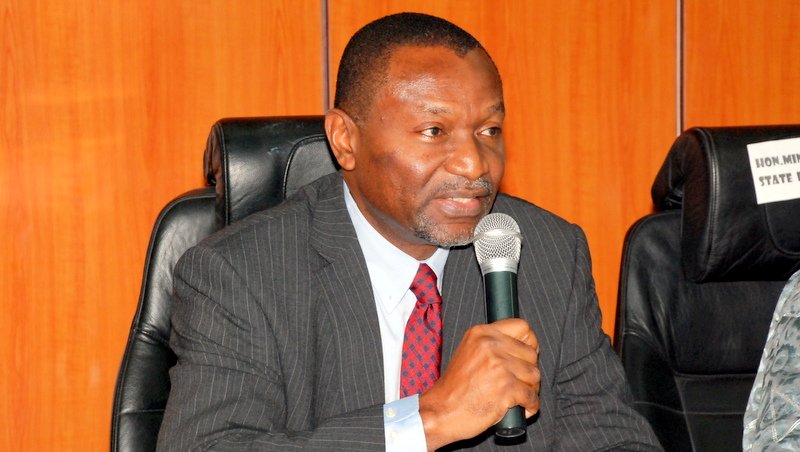- FG Optimistic Nigeria Will Exit Recession This Year
The federal government on Wednesday expressed optimism that the Nigerian economy was on the path of recovery, assuring the public that the country would crawl out of recession before the end of the year.
Making this disclosure while briefing journalists at the end of the Federal Executive Council (FEC) in Abuja, the Minister of Budget and National Planning, Senator Udoma Udo Udoma, said available indices had shown that the economy was recovering faster than it was envisaged.
According to him, whereas the International Monetary Fund (IMF) had forecast a contraction in Nigeria’s gross domestic product (GDP) growth rate by 1.8 per cent in 2016, the economy contracted by 1.5 per cent last year.
He said this was highly encouraging, but admitted that the recession was not over, adding that with more efforts put into the economic recovery agenda, Nigeria would definitely exit the recession before the end of the year.
He added that the report of the National Bureau of Statistics (NBS), which indicated that the economy recorded a contraction of 1.3 per cent in the fourth quarter of 2016, was another attestation that the economy was on a recovery path.
“With regards to the NBS report, as you are aware, in the fourth quarter of 2016, the economy contracted by 1.3 per cent which was a lower degree of contraction than the previous quarter and indicative that we are already turning around and beginning to recover, even though we are still in a recession. So the overall result was better than many people projected.
“The IMF report had forecast a GDP growth rate of -1.8 per cent for 2016 but it turned out to be -1.5 per cent. So, that’s better than expected but we are not out of the woods.
“It is encouraging, but we have to do more to make sure that we get the economy out of the recession this year.
“With regards to the things we plan to do in the next three to four years, they are spelt out in details in the Economic Recovery Growth Plan (ERGP).
“It involves a number of things but the key is to make this economy competitive so that we diversify. We want to do two broad things: one is to restore oil production and harvest what we can get from that sector, but also diversify by making the economy competitive so we would grow our agriculture and manufacturing.
“We will have value added in Nigeria and move from a consuming to a producing nation. That is the thrust of the plan. We believe we have the will and determination to achieve it,” Udoma stated.
The minister said the government was determined to get the economy out of recession before the end of the year, pointing out that the 2017 budget was structured to do just that.
“That is why we are anxious to get the budget passed, so that we can begin implementation and begin to take all the steps we need to get the economy out of recession,” he added.
Udoma, who said he briefed FEC on the ERGP that was released by his ministry on Tuesday, emphasised that the federal government was looking forward to the early passage of the budget, adding that doing so would fast-track the implementation of the recovery agenda.
He said a number of the recovery initiatives had already been incorporated into the budget.
He also said signs of economic recovery had been showing and encouraged the government to concentrate on solid minerals investment and simultaneously ensure that Nigeria’s infrastructure is revamped.
He also enumerated the five planks of the ERGP to include: human capital development, macroeconomic stability, agricultural revolution and food security, improved transportation, energy sufficiency and industrial growth.
“So we are encouraged but we are even more energised to put in more efforts in agriculture which is doing very well to do even better. To put in more efforts in the solid minerals sector, to make sure that our infrastructure is revamped because that is what will stimulate our economy if we continue in this way.
“You saw yesterday that the acting president went to break grounds for the railway project from Lagos to Ibadan all the way to Kano. As you know, the economic recovery and growth plan focuses on three objectives.
“One is restoring growth and that is what we are determined to do. Two is involving our people; our people are our greatest resource, and three is building a competitive economy because ultimately, the economy cannot do well unless it is competitive.
“So we are determined with this plan to make this economy great again. We are determined to move from the negative growth that we experienced in 2016 to a growth rate of 7 per cent by 2020,” Udoma submitted.
Also briefing newsmen, the Minister of Federal Capital Territory (FCT), Mohammed Bello, said the council approved the construction of the Greater Abuja water supply project at the cost of $470 million to provide “potable water to the greater part of the city and it intends to leverage on the facility that we have in the city”.
According to Bello, the project will be funded by the China Exim Bank, and listed the phases of water supply to various parts of the FCT.

 Naira4 weeks ago
Naira4 weeks ago
 Naira4 weeks ago
Naira4 weeks ago
 Travel3 weeks ago
Travel3 weeks ago
 Jobs4 weeks ago
Jobs4 weeks ago
 Naira3 weeks ago
Naira3 weeks ago
 Naira3 weeks ago
Naira3 weeks ago
 Investment4 weeks ago
Investment4 weeks ago
 Travel4 weeks ago
Travel4 weeks ago




























